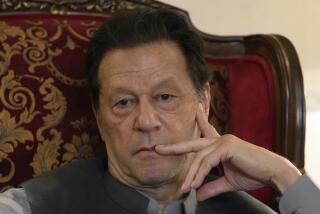Pakistan Owes U.S. Answers
- Share via
Pakistan’s clandestine sharing of nuclear plans and technology with the likes of North Korea and Libya has been exposed, but that should not end tough questions from Washington and international weapons inspectors.
Pakistani President Pervez Musharraf loaded his country’s nuclear proliferation sins onto the shoulders of the nation’s premier nuclear scientist, Abdul Qadeer Khan, last week and then pardoned Khan, who is revered as a national hero.
That was a sharp contrast with Musharraf’s promise in December to punish “enemies of the state” who passed on nuclear secrets.
The Bush administration praised Pakistan for breaking up Khan’s network of proliferation, but it maintained a discreet silence last week about Khan’s claim that he alone was responsible for passing on nuclear secrets to North Korea, Libya and Iran.
Khan’s confession contained the blame short of the barracks door. The army has ruled Pakistan much of the time since independence in 1947. Even when civilians governed, the army remained the dominant power. Musharraf, who seized power in a 1999 coup, remains an army general.
Musharraf’s pardon of Khan may short-circuit complaints from hard-line Muslims and other Musharraf opponents that he has torn down a man whose scientific exploits made Pakistan secure against India and gave an Islamic nation the bomb. Islamic radicals are the prime suspects in two attempts to assassinate Musharraf in December. His enemies accused him of caving in to Washington after Sept. 11, 2001, when he ended Pakistan’s support for the Taliban in next-door Afghanistan. The same foes charge him now with knuckling under to U.S. pressure in investigating Khan.
But if Washington is publicly silent, it should be privately thundering for answers. Khan should be made to produce a list of the companies that provided him with metals for centrifuges and other technology and the names of those to whom he gave nuclear blueprints and essential machinery to make weapons. Musharraf last week refused to open Pakistan’s nuclear facilities to international inspection, and Pakistan has refused to sign the Nuclear Nonproliferation Treaty.
The United States and the International Atomic Energy Agency will have to use all means of intelligence, from satellites overhead to spies on the ground, to do a better job of ensuring that no more nuclear secrets leave Pakistan. Musharraf has to live up to his pledge to stop the nuclear leakage if he wants Pakistan to be seen, in the long run, as more than just another rogue nation.
More to Read
Sign up for Essential California
The most important California stories and recommendations in your inbox every morning.
You may occasionally receive promotional content from the Los Angeles Times.












